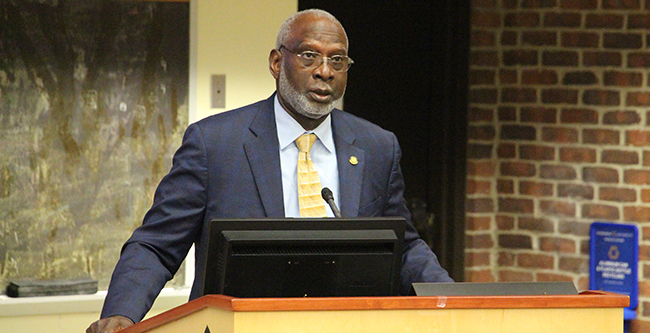
Photo by Matt Schorr
Former U.S. Surgeon General and past Meharry Medical College President David Satcher, MD, PhD speaks at Vanderbilt University School of Medicine.
NASHVILLE, Tenn. “George W. Bush really loved BB King,” David Satcher, MD, PhD quipped.
He paused after uttering those words, a grin playing on his lips. This prompted chuckles and even, in a few pockets of the audience gathered in the Vanderbilt University School of Medicine lecture hall, outright laughter.
The comment was simple, and yet layered with context. As a U.S. Surgeon General appointed by former President Bill Clinton, then-President Bush should’ve been – politically speaking – a rival. Yet, not only did both men work together for a year, they found common ground. Both men believed in the importance of healthcare initiatives. Both saw the need for ongoing public health operations.
Both men also, it turned out, enjoyed the blues.
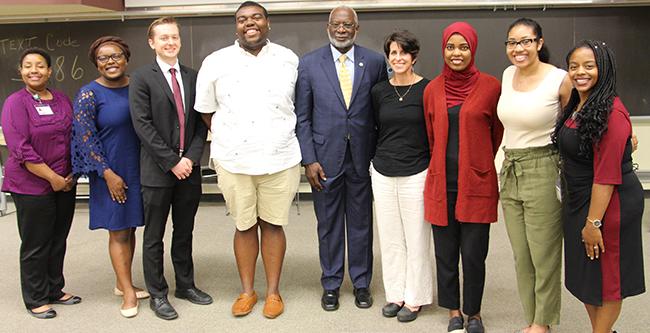
Photo by Matt Schorr
David Satcher, MD, PhD joins Meharry-Vanderbilt Alliance team members, students and others for a picture.
Common Ground
Common ground was important when it came to public health, Dr. Satcher told his audience. The inability to find it often created public health’s most difficult obstacles.
Obstacles, like walls, can hinder individuals suffering preventable illnesses from receiving the care they need, and Dr. Satcher occasionally faced those obstacles. Sometimes, he and his fellow physicians overcame them.
Other times, they didn’t.
And still other times, they overcame them too late.
Those memories were a major part of Satcher’s reflections when he returned to both the School of Medicine and the Meharry-Vanderbilt Alliance (MVA) on September 17, 2019.
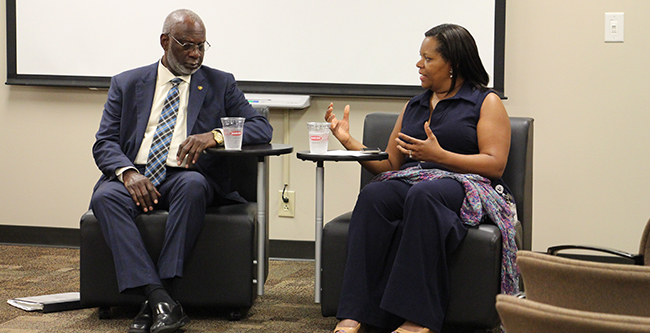
Photo by Matt Schorr
Meharry-Vanderbilt Alliance Executive Director Consuelo H. Wilkins, MD, MSCI speaks with David Satcher, MD, PhD during a roundtable discussion.
Roundtable
Dr. Satcher’s visit was part of the Flexner Deans’ Lecture Series, which features the world’s most eminent scientists speaking on policy issues in medicine. Before his appearance at the School of Medicine, Dr. Satcher visited the MVA for a Community Partner and Roundtable Discussion titled “Leadership & the Pursuit of Health Equity.”
Seated alongside Consuelo H. Wilkins, MD, MSCI, the MVA’s Executive Director, Dr. Satcher fielded questions about leadership, health inequities and more. When asked what he looked for in a potential leader, within the community or on a world stage, he grew thoughtful.
“We have a saying,” he said after several moments. “We need leaders who first care enough.”
Everything, he contended, grew from and tied back to that.
“We need leaders who learn enough,” he said. “We need leaders who do enough. We need leaders who will persevere until the job is done.”
America needs, he concluded, someone who really cares about people.
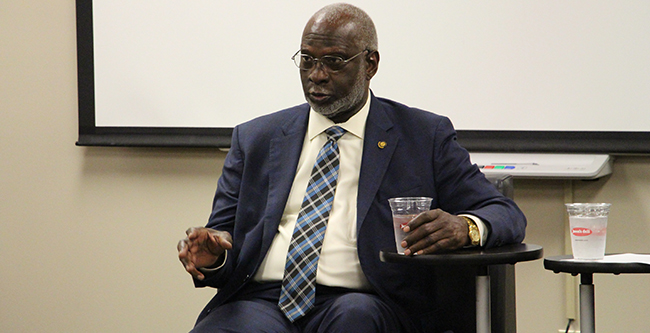
Photo by Matt Schorr
David Satcher, MD, PhD address the audience at a roundtable discussion.
Backstory
Dr. Satcher is a native of Alabama, born while World War II raged overseas. He developed whooping cough at the age of two, and a doctor told his parents he didn’t expect the boy to live. Nonetheless, he spent the entire day with young Dr. Satcher and told his parents how to provide him with the best chance for survival.
That story, Dr. Satcher recalled in a 2008 interview, inspired him to become a doctor.
A longstanding critic of health inequality in America, Dr. Satcher has long vocalized the negative impacts of health disparities on minorities. Among his earliest efforts to bring light to that situation is the Journal of Health Care for the Poor and Underserved, which he published in 1990 while still President of Meharry Medical College (MMC).
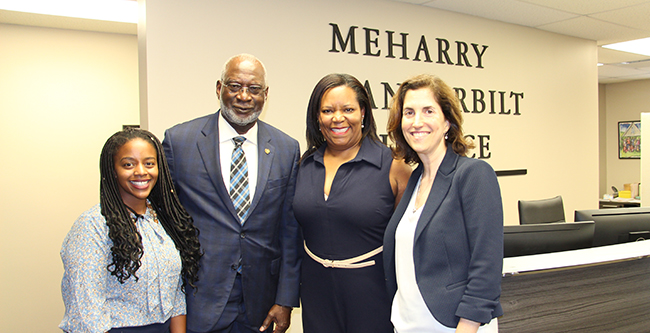
Photo by Matt Schorr
MVA Program Manager Jacquelyn S. Favours, MPH, CHP, CHES; David Satcher, MD, PhD; Meharry-Vanderbilt Alliance Executive Director Consuelo H. Wilkins, MD, MSCI; and MVA Director of Planning and Community Engagement Elisa Friedman, MS.
Social Determinants
Dr. Satcher continued those efforts when he appeared at the MVA and School of Medicine. Facing a room full of community advocates, he said, “As a country, we treat medicine as a business rather than a service.”
The statement drew quiet nods. Others familiar with the notion frowned, another form of silent agreement.
“So many people are left out,” Dr. Satcher added, “We’re not seeing everybody.”
Other nations like Switzerland, England and Canada spend much less than America on healthcare, he pointed out. However, they spend more on keeping people healthy.
“We’ve got to focus more on the social determinants of health than we are,” he said. “We have to demonstrate, first and foremost, that we can make a difference. And we have to demonstrate the benefits of that difference.”
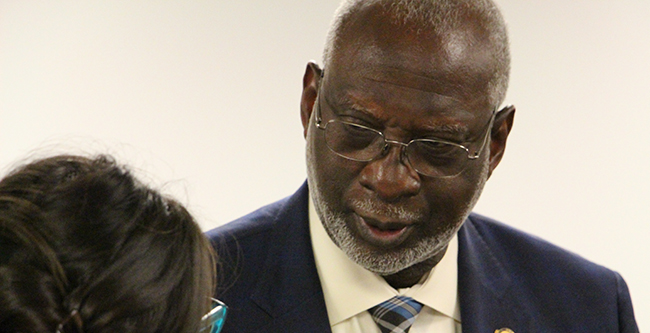
Photo by Matt Schorr David Satcher, MD, PhD meets with community members following his roundtable discussion at the MVA.
Smallpox
At the School of Medicine, where he quipped about President Bush’s love for BB King, Dr. Satcher’s lecture was titled “Revisiting the Highs and Lows of Public Health Practice.” This lecture was the tenth of the Annual David Satcher Lecture series at Vanderbilt, a series which Dr. Satcher noted he was the inaugural lecturer.
Among the highs was the eradication of smallpox, a highly infectious, debilitating and often deadly disease that ravaged much of the world. It took nearly two centuries, but a commission of scientists declared the diseased had been completely wiped out in 1980. It was the result of tireless efforts by the World Health Organization (WHO), physicians, scientists and researchers across the globe.
Tuskegee
A particular low point, Dr. Satcher noted, was the Tuskegee Study conducted between 1932 and 1972. The now infamous experiment observed the natural history of untreated syphilis in African American men, who were only told they were receiving free health care.
Numerous participants died as a result. Likewise, many spouses were also infected and several children were born with congenital syphilis.
In 1997, President Bill Clinton formally apologized on behalf of the United States to victims of the experiment. That, Dr. Satcher explained, needed to happen, but the American people – and, in particular, African Americans – still haven’t recovered from it.
Medical research lost a great deal of public trust, as a result, and they’ve yet to really get it back.
Polio
Polio, meanwhile, fell into both categories as a high and a low for Dr. Satcher.
Following widespread use of a vaccine in the mid-1950s, polio incidences rapidly declined in most industrialized countries. In 1988, the WHO and other organizations began efforts to eliminate the disease completely.
Dr. Satcher was part of that effort.
In 1994, the Americas were certified as polio-free. By 1998, the last case of polio was reported in Europe. A year later, India declared the illness eradicated.
Dr. Satcher and his fellow physicians hit a roadblock, however, in Middle Eastern countries. Because of the ongoing violence and fighting, they couldn’t get the vaccine to numerous children.
He recalled meeting men who were infected. One of them told Dr. Satcher he might’ve escaped infection, but he couldn’t reach the clinic because of the fighting. It was a hard revelation, knowing how close the man had been to a cure.
But, he said the man told him, all of his children received the vaccination. Although he’d contracted the disease, at least he would be the last in his family to do so.
Violence
“Violence is one of our greatest challenges in public health,” Dr. Satcher lamented. “Wouldn’t it be great if people stopped fighting to save lives?”
This, too, prompted laughter from the audience. Much like his comment about President Bush and BB King, this statement was simple on its face. Stop fighting and just save lives would seem to be a simple notion that everyone could get behind.
Reality, however, much like Dr. Satcher’s statement, is far more layered and complex.
*Dr. Satcher’s visit is made possible by the Vanderbilt School of Medicine Master of Public Health (MPH) Program.
About the Meharry-Vanderbilt Alliance
Founded in 1999, the Alliance bridges the institutions of Meharry Medical College and Vanderbilt University Medical Center. Its mission is to enrich learning and advance clinical research in three primary areas -- community engagement, interprofessional education and research -- by developing and supporting mutually beneficial partnerships between Meharry Medical College, Vanderbilt University Medical Center and the communities they serve. Through community engagement, the Alliance serves a large community of stakeholders including surrounding universities and colleges, community organizations, faith-based outlets and community health centers. Its interprofessional education enhances students' interdisciplinary understanding and improves patient outcomes through integrated care. The research conducted provides access to experienced grant writers and materials supporting the grant application process and facilitates grant-writing workshops.